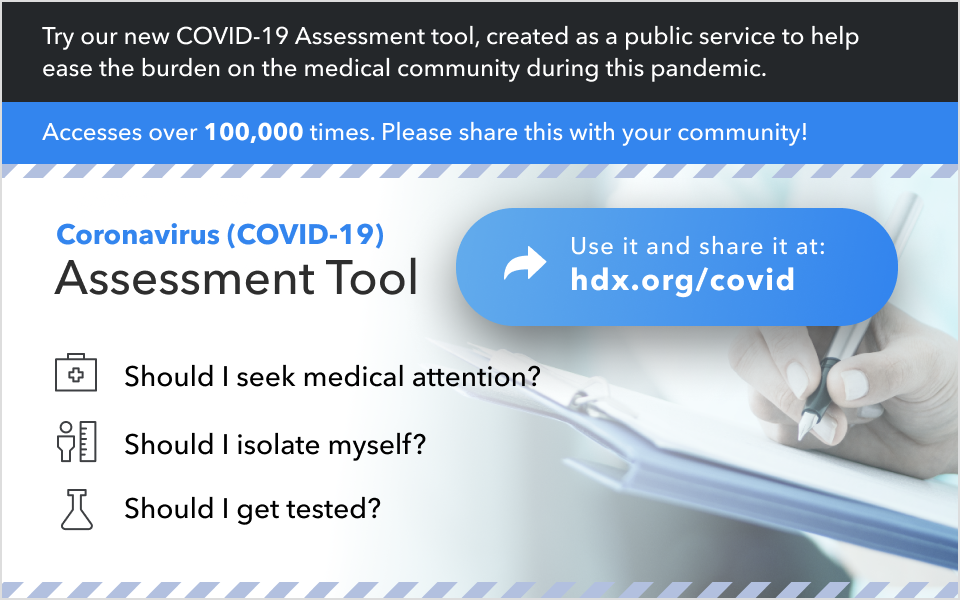COVID-19 Assessment Tool by the Human Diagnosis Project
I’m pleased to report that the Human Diagnosis Project has produced an online COVID-19 assessment (forward triage) tool, which is freely available here: http://hdx.org/covid (no signup required).

The tool aims to help support our frontline medical professionals and reduce the burden on our healthcare system through this rapidly evolving pandemic. At its core, it aims to answer three crucial questions:
Should I try to get medical help (for symptoms relating to COVID-19)?
Should I isolate myself (and to what degree)?
Should I try to get tested?
The tool is being updated regularly based on feedback from the medical community. It is currently available in English, Spanish, Italian, and Greek, with several more translations in the works. If you can help connect us with further translation capability, please reach out. Similarly, contact us if you have feedback on the medical accuracy of the tool.
I hope that this community can help with two things in particular:
Improving this tool through feedback
Spreading knowledge of this tool as widely as possible
----
Now, for a few words about the Human Diagnosis Project. I’d planned to write a larger introduction for the EA Forum at some point, but time is extremely limited, so this will have to do for now.
Context: I work for the Project.
Here are some of my personal thoughts on the Project. None of this should be construed as something being said by the Project itself.
The Human Diagnosis Project aims to make a fundamental advance in humanity’s ability to diagnose all illnesses (i.e., figure out what the “next steps” are to help any patient) and make this ability available to all of humanity—for free—within the next ten years or so.
Accurate diagnosis is a fundamental part of both long-term survival and maintaining good health.
Diagnosis is currently surprisingly bad even in highly developed countries. Diagnosis is extremely difficult in less developed countries, where we aim to do the most good in the coming years.
The Project has already proven that it can provide high accuracy diagnoses via collective intelligence and that it has created the first robust and scalable measure of diagnostic performance.
The Project uses collective intelligence and machine learning to augment the abilities of health professionals, allowing the health system to do (much) more with less. In the very long run, the Project will be able to provide medical decision support and even diagnosis without incremental human effort.
Since the Project’s operates in the digital sphere, it is able to scale at near-zero marginal cost. Providing this service to the entire world will only be marginally more expensive than providing it within a single health system.
In terms of QALYs, my conservative estimate is that the Project has the ability to deliver at least hundreds of millions of QALYs over the next fifteen years or so.
Overall, the Project is highly EA-aligned. This is evident in the institution’s goals, conduct, and the fact that a significant portion (at least half) of the team explicitly identify as Effective Altruists.
More about the Project:
The Human Diagnosis Project (also referred to as “Human Dx” or “the Project”) is a worldwide effort, created with and led by the global medical community, to build an open intelligence system that maps the steps to help any patient. By combining the collective intelligence of medical professionals and trainees with machine learning, Human Dx intends to enable more accurate, affordable, and accessible care for all. The Project’s creation and development has been inspired by other civilization-scale scientific projects (e.g., the International Space Station, the Large Hadron Collider at CERN, and the Human Genome Project) and open technology efforts (e.g., Wikipedia, Linux, and the Internet Protocol Suite).
The Project is structured as a partnership between the social, public, and private sectors. Its partners include many of the nation’s top medical societies (including the American Medical Association and National Association of Community Health Centers), boards (including the American Board of Medical Specialties and American Board of Internal Medicine), academic centers (including Harvard, Hopkins, UCSF, Berkeley, and MIT), and financial supporters (including the MacArthur Foundation, Moore Foundation, Commonwealth Fund, Union Square Ventures, Andreessen Horowitz, and Y Combinator). Human Dx has also been honored by the MacArthur Foundation in its 100&Change competition as one of eight organizations globally with a bold solution to a critical social problem.
Using the Human Dx system, medical professionals and trainees can collaborate on any case, question, or other medical topic. As they do, the system encodes their thought processes and decisions into structured clinical data to map the steps to help any patient. Today, thousands of medical professionals and trainees from over 80 countries and 500 medical institutions are involved in building the Project, which is already impacting both medical training and clinical decision-making.
For more information, see the Background of the Human Diagnosis Project.
An update here: This COVID-19 forward triage tool now also allows anyone to get a doctor to look at their particular case for an extremely low fee ($12 USD—though free service is currently available if needed).